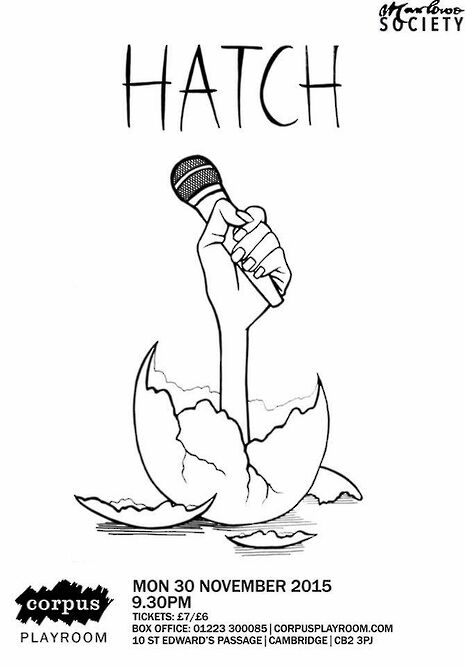Review: Hatch
Isabel Maloney was impressed with this medley of new writing
3.

The Marlowe Society’s HATCH is an interesting feature on the theatre scene, involving scenes of new theatrical and poetic writing in its early phases being informally performed in swift succession. Going to this sort of showcase can be a strange experience, to say the least; the rapid shifts of tone, mood and genre between scenes can be jarring, Forrest Gump’s classic line about life being like a box of chocolates suddenly acquires new meaning, and you may well wonder what the point of taking these scenes out of context really is. However, HATCH exceeded these fairly pessimistic expectations of mine, perhaps owing to the relaxed atmosphere and casual set up which were well-suited to the Corpus Playroom and immediately put the audience at ease.
An evening like this is bound to be a mixed bag, but of the many highlights one sketch in particular stood out: 'When All Is Said and Done' by Beth Davidson. It was sharp, topical, and unpretentiously funny – exactly what a comic sketch ought to be. Praise must also go to its actors, who enjoyed the biggest laughs of the night with well-observed comedy, and sitcom-style humour which, though effective, seemed incongruous when positioned between scenes dealing with darker issues, such as abortion, death, and a seeming preoccupation with dead bodies throughout the evening. Other standout scenes were the opening 'Megabus', in which author Rachel Tookey managed to balance dark humour with a fairly frank discussion of abortion. The performers, Isobel Laidler and Tom Chamberlain, got the performance off to a strong start with very engaging acting. Peter Price’s scene was also incredibly well written and acted to perfection, but unfortunately lost some of its impact among largely comic extracts.
Described as a “showcase of scratch performances of new dramatic and poetic works in progress” it is unsurprising and, in fact, pleasant that HATCH was largely unpolished, but some more directorial input wouldn’t have gone amiss in some cases, with a few actors too reliant on their scripts or too static on stage to the point of distracting from the production’s focal point of providing a platform for new writing. Another shortcoming was its occasional descent into cliché, with ‘Reflections’ prompting a friend to say she couldn’t tell what was a joke and what was serious. Neither could I.
However, it was this very mixture of many enjoyable, few forgettable and even fewer disappointing scenes that made the evening compelling; showcases such as these do make you more aware of the language to which you are listening. This style of event removes some of the pressure inherent in being an audience member, which was frankly a welcome and refreshing change; HATCH more than achieved what it set out to do and I would certainly recommend stopping by next time to see an unaffected presentation of some beautiful writing in its early stages.
 News / Fitz students face ‘massive invasion of privacy’ over messy rooms23 April 2024
News / Fitz students face ‘massive invasion of privacy’ over messy rooms23 April 2024 News / Climate activists smash windows of Cambridge Energy Institute22 April 2024
News / Climate activists smash windows of Cambridge Energy Institute22 April 2024 News / Copycat don caught again19 April 2024
News / Copycat don caught again19 April 2024 Comment / Gown vs town? Local investment plans must remember Cambridge is not just a university24 April 2024
Comment / Gown vs town? Local investment plans must remember Cambridge is not just a university24 April 2024 News / Cambridge University disables comments following Passover post backlash 24 April 2024
News / Cambridge University disables comments following Passover post backlash 24 April 2024




